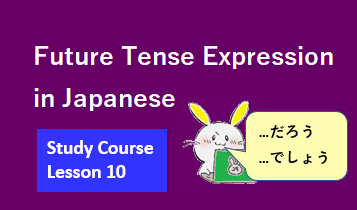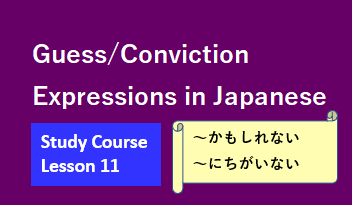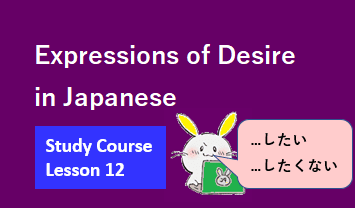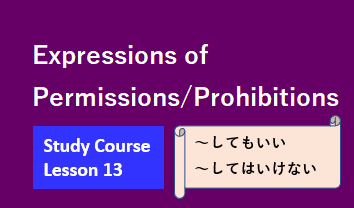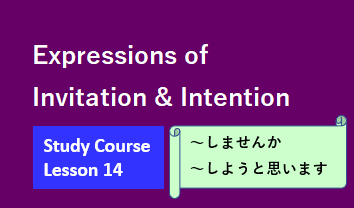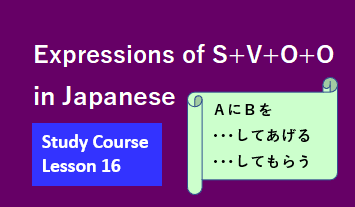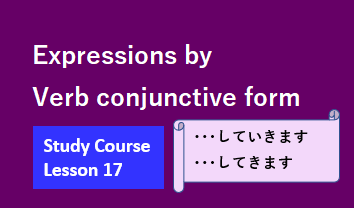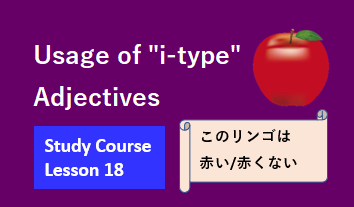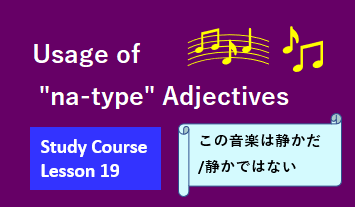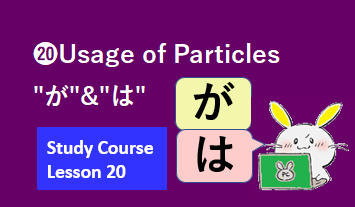Japanese Study Course Lesson15

In lesson 15, we will study the expressions of requests such as "Please do …" or "Will you please do…". For example, if you want to say, "Please open the window." in Japanese, you would politely say "窓を開けてください。".
15-1 Expressions of requests (Verb)
(1)・・・してくれ/・・・してください
Expressions of request ➡ "Verb( conjunctive form )+て+くれ/ください"
- Open the window.
- Ordinary:窓を開けてくれ。
- Please open the window.
- Politely:窓を開けてください。
- The ordinary sentence of the request expression sounds a bit imperative, so the polite sentence usually should be used. A case where the ordinary sentence is used is some situation when a senior or an older makes a request to a junior or a younger, such as a father making a request to his children at home.
- Replacing "くれ" with "ください" makes it more polite.
◆Detailed explanation
- Ordinary:窓を開けてくれ。
- Politely:窓を開けてください。
- 窓(object)+を(objective particle)
- +開け(verb "開ける", conjunctive form)+て(conjunction particle)、
- +くれ(verb "くれる", imperative form)/ +ください(verb "くださる", imperative form)。
◆Vocabulary note
| 窓 :(noun) window 開ける :(verb) open くれる :(verb) give くださる:(verb) give, polite form of "くれる" |
◆Advanced Study Conjugation of the verb "くれる"(Lower one-step)
| Negative form くれ(ない) Auxiliary verb "ない" is added after | 私の両親はあまり私のことをほめてくれない。 My parents don't compliment me very much. |
| Consecutive form くれ(ます/ません/ました) Auxiliary verb "ます/ません/ました" is added after | 私の祖父は私のことをよくほめてくれました。 My grandfather used to compliment me. |
| Past tense form くれ(た) Auxiliary verb "た" is added after | 私の伯父さんは私のことをほめてくれたことがありません。 My uncle has never complimented me. |
| Conjunctive form くれ(て) Conjunction particle "て" is added after | 私は私の両親も祖父のようにもっと私のことをほめてくれてもよいと思います。 I wish my parents would praise me more like my grandfather did. |
| Basic form くれる | くれる give |
| Adnominal form くれる(+noun) Noun is added after | 私は子供の時に、兄が一緒に遊んでくれるときが一番たのしかった。 When I was a child, I was happiest when my brother played with me. |
| Hypothesis form くれれ(ば) Conjunction particle "ば" is added after | 一番年上の姉がもっと私と遊んでくれればよかったが、あまり遊んでくれた記憶がない。 I wish my oldest sister would play with me more, but I don't remember her playing with me much. |
| Imperative form くれ くれ(よ) The form for giving orders | 窓を開けてくれ。 Open the window. |
The conjugation of the verb "くれる" is called the lower one-step conjugation of the verb because they all include the "e" sound, such as "くれない, くれます, くれる, くれれば, くれよ".
◆Advanced Study Conjugation of the verb "くださる"(Lower one-step)
| Negative form くださら(ない) Auxiliary verb "ない" is added after | 私の両親はあまり私のことをほめてくださらない。 My parents don't compliment me very much. |
| Consecutive form くださり(ます/ません/ました) Auxiliary verb "ます/ません/ました" is added after | 私の祖父は私のことをよくほめてくださりました。 My grandfather used to compliment me. |
| Past tense form くださっ(た) Auxiliary verb "た" is added after | 私の伯父さんは私のことをほめてくださったことがありません。 My uncle has never complimented me. |
| Conjunctive form くださっ(て) Conjunction particle "て" is added after | 私は私の両親も祖父のようにもっと私のことをほめてくださってもよいと思います。 I wish my parents would praise me more like my grandfather did. |
| Basic form くださる | くださる give, polite form of "くれる" |
| Adnominal form くださる(+noun) Noun is added after | 私は子供の時に、兄が一緒に遊んでくださるときが一番たのしかったです。 When I was a child, I was happiest when my brother played with me. |
| Hypothesis form くだされれ(ば) Conjunction particle "ば" is added after | 一番年上の姉がもっと私と遊んでくだされればよかったですが、あまり遊んでくださった記憶がありません。 I wish my oldest sister would play with me more, but I don't remember her playing with me much. |
| Imperative form くだされ ください The form for giving orders | 窓を開けてください。 Please open the window. |
The conjugation of the verb "くださる" is called the lower one-step conjugation of the verb because they all include the "e" sound, such as "くだされない, くだされます, くださる, くだされれば, くだされ".
(2)・・・してくださいませんか
Expressions of request ➡ "Verb( conjunctive form )+て+ください+ませんか"
- Could you please open the window?
- More Polite:窓を開けてくださいませんか。
- Adding "ませんか" to the end of "~してください" like "窓を開けてくださいませんか。" makes the request more polite.
◆Detailed explanation
- More Polite:窓を開けてくださいませんか。
- 窓(object)+を(objective particle)
- +開け(verb "開ける", conjunctive form)+て(conjunction particle)、
- +ください(verb "くださる", imperative form)+ません(compound auxiliary verb, polite negative)+か(ending particle, question)。
- We learned about negative question's sentences in Lesson14: Expressions of Invitation & Intention, but in addition to this usage, we can make polite request sentences like this example.
- ※See Lesson5 for more information about "ません".
15-2 Expressions of requests (Noun)
(1)~をくれ/~をください
Expressions of request ➡ "Noun+を+くれ/ください"
- Give me a hamburger and a cola.
- Ordinary:ハンバーガーとコーラをくれ。
- A hamburger and a cola, please.
- Politely:ハンバーガーとコーラをください。
- The ordinary sentence of the request expression sounds a bit imperative, so the polite sentence usually should be used. A case where the ordinary sentence is used is some situation when a senior or an older makes a request to a junior or a younger.
- Replacing "くれ" with "ください" makes it more polite.
◆Detailed explanation
- Ordinary:ハンバーガーとコーラをくれ。
- Politely:ハンバーガーとコーラをください。
- ハンバーガーとコーラ(object)+を(objective particle)
- +くれ(verb "くれる", imperative form)/ +ください(verb "くださる", imperative form)。
◆Vocabulary note
| ハンバーガー:(noun) hamburger コーラ :(noun) cola |
(2)~を2つくれ/~を2つください
Expressions of request ➡ "Noun+を+(quantity)+くれ/ください"
- Give me two hamburgers.
- Ordinary:ハンバーガーを2個くれ。
- Two hamburger, please.
- Politely:ハンバーガーを2個ください。
- The ordinary sentence of the request expression sounds a bit imperative, so the polite sentence usually should be used.
- Replacing "くれ" with "ください" makes it more polite.
◆Detailed explanation
- Ordinary:ハンバーガーを2個くれ。
- Politely:ハンバーガーを2個ください。
- ハンバーガー(object)+を(objective particle)+2個(quantity)
- +くれ(verb "くれる", imperative form)/ +ください(verb "くださる", imperative form)。
(3)~を(2つ)お願いする/します
Expressions of request ➡ "Noun+を+(quantity)+お願いする/します"
- First, I'd like two beers, please. I would also like a large serving of spicy curry rice, please.
- Ordinary:最初にビールを2本お願いする。それと、スパイシーなカレーを大盛りでひとつお願いする。
- Politely:最初にビールを2本お願いします。それと、スパイシーなカレーを大盛りでひとつお願いします。
- Replacing "する" with "します" makes it more polite.
◆Detailed explanation
- Ordinary:最初にビールを2本お願いする。それと、スパイシーなカレーを大盛りでひとつお願いする。
- Politely:最初にビールを2本お願いします。それと、スパイシーなカレーを大盛りでひとつお願いします。
- 最初に(adverb)
- +ビール(object)+を(objective particle)+2本(quantity)
- +お願いする(verb, basic form)/ +お願いし(verb "お願いする", consecutive form)+ます(auxiliary verb, polite)。
- それと(conjunction)、
- +スパイシーなカレー(object)+を(objective particle)
- +大盛り(quantity)+で(objective particle, quantity)+ひとつ(quantity)
- +お願いする(verb, basic form)/ +お願いし(verb "お願いする", consecutive form)+ます(auxiliary verb, polite)。
◆Vocabulary note
| 最初に :(adverb) first ビール :(noun) beer お願いする :(verb) please do something スパイシーな:(adjective) spicy カレー :(noun) curry/curry rice 大盛り :(noun) large serving ひとつ :(noun) one |
◆Advanced Study Objective particle "で" ③:quantity
- There are many ways to use the objective particle "で", but the usage here indicates the quantity.
- It is used in the form of "noun(quantity)+ で".
- For example, The show will start in 10 minutes. あと10分で開演です。
- I would like a large serving of spicy curry. スパイシーなカレーを大盛りでひとつお願いします。
At a restaurant, when a customer orders a large serving of spicy curry, what does the clerk say? It is "かしこまりました。".


Today's lesson ends here. Ladies and gentlemen, did you understand today's theme "Expressions of requests"? Next time, we will study "Expressions with two objects, such as the sentence pattern "S+V+O+O". See you!
See you next time!

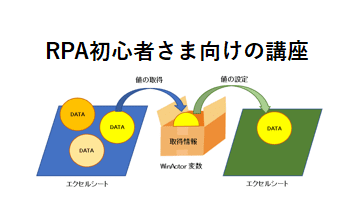

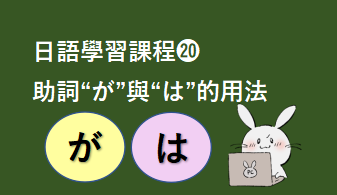

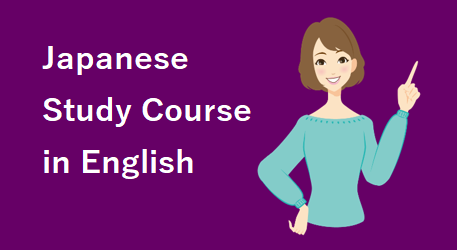
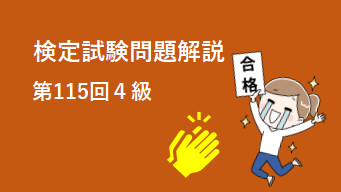
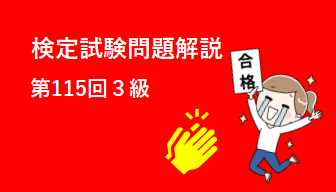

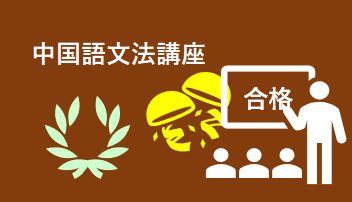
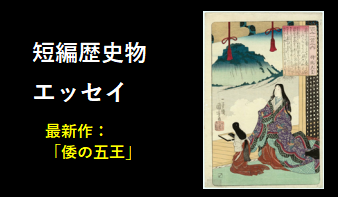
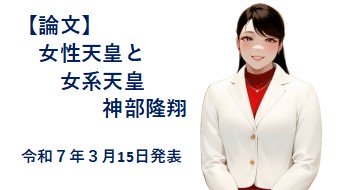

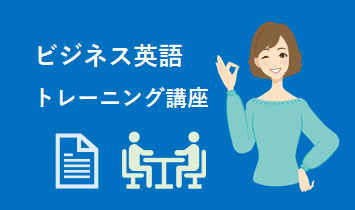

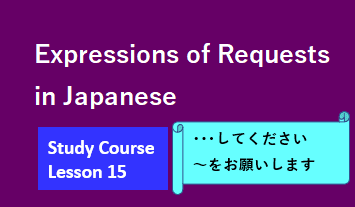


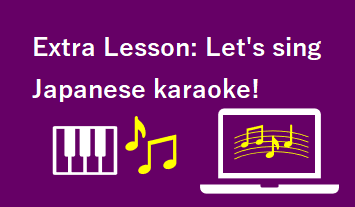
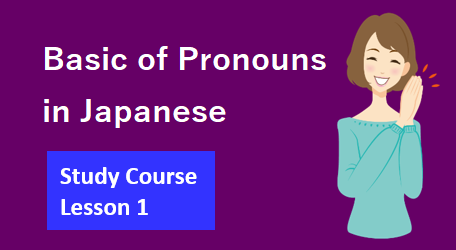
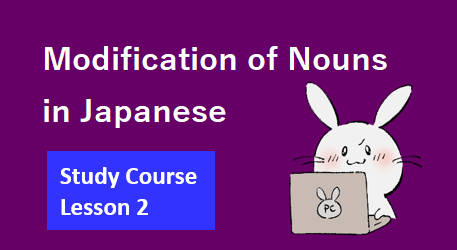

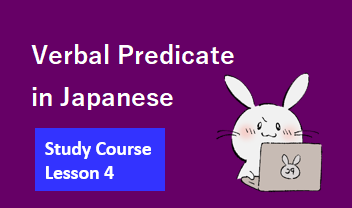
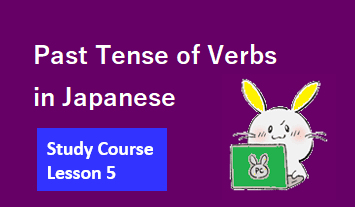
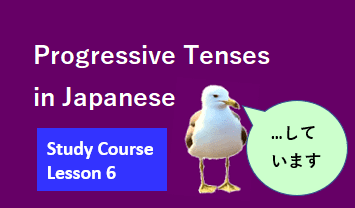
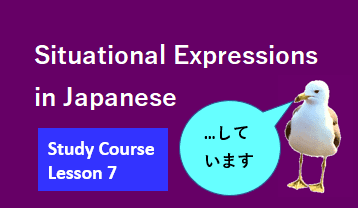
![❽Possible Expressions [1]](https://ryusho-kanbe.com/wp-content/uploads/2023/04/スクリーンショット-2023-04-03-100754.png)
![❾Possible Expressions [2]](https://ryusho-kanbe.com/wp-content/uploads/2023/04/スクリーンショット-2023-04-28-095816.png)
